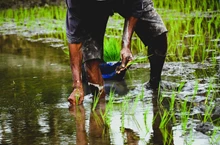
Radish is an edible root vegetable. Radishes are grown and consumed all over the world, mainly eaten raw as a crisp vegetable salad with a spicy flavor. Radish is not only a tasty vegetable but it is also very good source of vitamins A, C, B6, E and K.
Along with vitamins, it is also a good source of phosphorus, potassium, copper calcium, iron and manganese.
There are many types of radishes, each with its own unique appearance and taste. Their crunchy texture, prickly sharpness, and colorful appearance make them the perfect vegetable to complete a variety of delicious dishes. But they are more than just a beautiful decoration.
Some of the varieties of radish are mentioned below with detailed description:
Water Melon Radish:
Watermelon radish is juicy, crunchy, and slightly sweet, but with a hint of pepper. They have a milder flavor than traditional red radishes, but are much larger. If you are eating watermelon radish then your intake of vitamins and minerals is almost sufficient as it is rich in phosphorus, potassium, magnesium, calcium, vitamin A and vitamin C.
A few thinly sliced watermelon and radish slices can beautify any dish, and it is often done in the Chinese cuisine, where they originated. They also taste very good. This is a relatively smooth, juicy and sweet radish, but it has a spicy flavor when cut.
French Breakfast Radish
French breakfast radishes may be shaped like a round root, but most of them are rectangular, 2 to 4 inches long. Whether it is round or cylindrical, French breakfast radishes are known for their bright colors, ranging from bright purple-red to sharp white.
French breakfast radish contains vitamin C, calcium, magnesium, folic acid and potassium. Radishes are recommended by practitioners of natural medicine because they promote healthy digestion. French breakfast radish also contains glucosinolates, which have been proven to be beneficial in preventing certain cancers and give radishes a unique spicy taste.
Daikon White Radish
Daikon is a tuber that resembles large carrots in shape and tastes similar to mild carrots. It is grown in many Asian countries, and it is the most widely consumed vegetable in Japan.
It is believed that Daikon radish provides enzymes that assist the synthesis of starches and fats. Its roots were used to steep into teas and boiled with seaweed to detox the body and eliminate the harmful infections within the digestive system.
Daikon has the right amount of nutrients. Unlike common beliefs, it doesn't have a lot of fiber to chew, but it's rich in potassium. It Contains 263 milligrams of potassium and 25.5 milligrams of vitamin C. It also contains small amounts of folic acid, calcium, magnesium and phosphorus.
Malaga Radish
It looks like a golf ball with long, rich green leaves that represent these relatively small sizes. These radishes taste mild and earthy. It is crispy, soft and incredibly versatile. If you plan to grow your own radishes, consider the same excellent radishes for pastries, cooking and fermented foods.
Pink Radish
Pink radish is well known for its pink skin color that has round elongated shape. Pink radish contains high levels of vitamins C and B9, fiber, potassium and magnesium, play a role in keeping the immune system and nervous system running. They work to reduce wasting, protect cells from oxidative stress, and prevent a variety of cancers.











